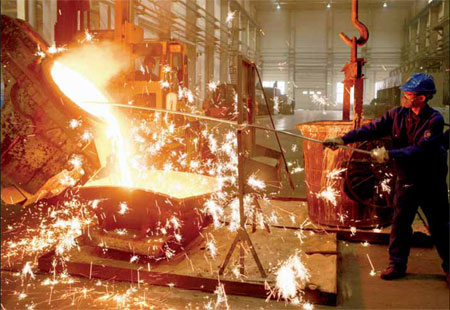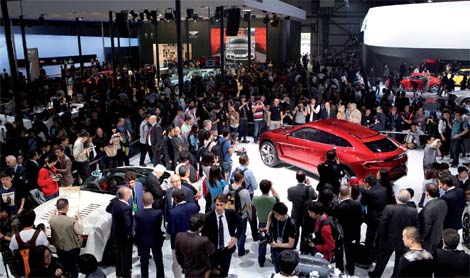Gateway to gold rush
Updated: 2012-09-20 12:48
By Fu Jing (China Daily)
|
|||||||||||
|
A worker forges engine parts in a Weichai Group factory. The Chinese company is acquiring a 25 percent stake in Kion Group GmbH. Zhu Zheng / Xinhua |
Chinese businesses make a beeline to German state with flurry of deals
Hessen, the wealthiest state in Germany and home to multinational firms such as Opel, Merck and Deutsche Bank, has emerged as one of the frontrunners for new investment in Europe by Chinese investors.
The German state was already in the limelight last month when the State-owned Chinese company Shandong Heavy Industry Group - Weichai Group said it would invest 738 million euros ($922 million) by the end of this year to buy a minority stake in the Hessen-based forklift maker Kion Group GmbH. It was the largest direct investment in Germany by a Chinese company till date.
According to information provided by Hessen officials, Chinese enterprises account for more than half of the newly opened companies in the state this year. Without giving any figures, the officials said the Chinese investment has helped to maintain the growth momentum of the German state.
Chinese companies like Huawei and Hai'er along with about 500 other firms now have a significant presence in Hessen despite their late overseas moves.
In contrast, nearly 700 companies from Hessen have a presence in China. However, according to industry experts, there is an imbalance in terms of numbers, German companies have been present in China for several years now.
Shandong Heavy's Weichai Power Co Ltd is acquiring a 25 percent stake in Kion, the world's second-largest forklift maker by sales, for 467 million euros, and a 70 percent stake in Kion's hydraulics business - which will be operated as an independent company - for 271 million euros.
The deal is expected to better the record set by heavy machinery maker Sany, which purchased a 90 percent stake in German concrete pump manufacturer Putzmeister for 324 million euros and spent 100 million euros to set up Sany Germany Co Ltd in Cologne.
"The Weichai transaction is scheduled to be completed in December," says Michael Hauger, corporate communications head of Kion Group GmbH. "With such a high level of strategic synergy, the goal is to build a world-class industry alliance."
Tan Xuguang, chairman and CEO of Weichai Power, says: "The partnership is an important step in our five-year strategy to globalize and expand our business activities in new markets and products.
"We will ensure stability of employment and the production sites, as well as continuity in the management of Linde Hydraulics, a Kion subsidiary."
"The strategic partnership is an important catalyst for our strong and future growth in Asia and China," says Gordon Riske, chief executive of Kion.
Riske says the tie-up will extend to the industrial trucks and the hydraulics businesses, with the latter gaining immensely from Weichai Power's expertise in engines and drive technology.
Apart from the big numbers, the Weichai deal is also significant in the sense that it reaffirms the findings of an earlier survey by global consultancy major Ernst & Young that Germany is the best location in Europe for overseas Chinese investment. The survey was conducted among 400 executives of large and medium-sized Chinese companies, many of whom said that they are considering Germany as a possible investment destination.
According to the survey, one out of every four Chinese managers said that Germany was one of the three most appealing locations for global investment. The other two were China with 61 percent and the US at 29 percent. Within Europe, Germany was the most popular location among 63 percent of respondents, ahead of France at 13 percent.
Among the Chinese companies planning to invest in Germany, Europe's strongest economy, 9 percent of them are expecting to make acquisitions, while 56 percent prefer joint ventures.
As for the sectors, 57 percent said they were interested in mechanical engineering, with the automobile industry taking second place.
In March, the Berlin-based foreign trade and investment promotion agency Germany Trade & Invest reported that China became the biggest foreign investor in Germany in 2011, with 158 greenfield investment projects, ahead of the US with 110 and Switzerland with 91.
Excluding mergers and acquisitions, the number of Chinese foreign direct investment projects related to greenfield and expansion investment in Germany reached 80 in 2011, according to figures issued by the German Federal Statistical Office. In contrast, there were seven in 2007.
Data from Markus Database of Bureau van Dijk Electronic Publishing reveals that last year about 800 Chinese companies in Germany hired nearly 7,700 employees. Among the 800 companies, about 500 are in Hessen.
With its European headquarters in Hessen, telecom equipment maker Huawei Technologies Co Ltd has emerged as China's biggest employer in Europe, with more than 6,000 employees across the continent, 70 percent of these being local hires.
The company has had a presence in Germany for more than 10 years, and about 1,600 employees in 20 locations, according to Olaf Reus, Huawei's director of public affairs and government relations in Germany.
One of the reasons why Chinese investors are increasingly looking to Germany is because of the relatively fair investment policies. The soaring trade volume between China and Germany has also helped garner more investment.
Germany is famous for its sophisticated logistics network. It has about 100 airports, as well as well-developed rail, river and sea freight industries. It ranks No 1 worldwide in terms of overall assessment of infrastructure and transportation, with France taking third place, Singapore in fourth place and the US in eighth place.
In Germany, it is also easy to open a company. It costs just 1 euro to open a micro company, while the registration capital for a joint venture is at least 25,000 euros.
Hessen has long enjoyed all these advantages.
Frankfurt is located in the heart of Europe and has easy access to other parts of the continent. Frankfurt has Germany's biggest airport, the third-biggest in Europe. This has helped direct flow of personnel and goods between China and Germany.
Norbert Noisser, deputy head of foreign trade, location policy of Hessen's Ministry of Economics, says there are 128 passenger flights and 38 freight flights every week between Frankfurt and China.
Frankfurt is the largest city in Hessen and has a highly internationalized financial, stock trading center, and is also the seat of the European Central Bank and the German central bank. Most leading Chinese lenders have also set up branches in Frankfurt to capitalize on the growing trade ties.
China's consulate in Frankfurt is also the biggest in the world, while the city is home to several Chinese language schools.
"Hessen is an ideal location for Chinese companies to start their business in Europe," Noisser says.
He says Hessen is now focusing on offering professional services to attract more investment from China and strengthen cooperation with high-end industries. "We are facilitating direct contacts among companies in both countries."
Most of the plans have been based on China's 12th Five-Year Plan (2011-15), he says, which lays extra emphasis on overseas expansion. Compared with other states, Hessen will focus on its advantages and seek partnerships in energy, information technology, bio-technology and logistics with China.
"There is huge demand and space to expand Chinese investment to Germany," says Cao Yi, senior public relations manager of Germany Trade & Invest.
The automotive, industrial machinery and equipment sector has accounted for more than a quarter of all Chinese projects in Germany since 2007, according to the agency.
"Chinese FDI is increasing rapidly," says Zhao Hui, a lawyer at the Frankfurt-based law firm Noerr LLP. He says that Chinese companies are now supported by a professional team including financial experts, lawyers and marketing specialists.
With the Chinese government firmly backing the overseas expansion moves, Zhao says Chinese companies can also have easy access to support services provided by professionals in Frankfurt.
China's former ambassador to Germany Wu Hongbo says Germans are hardworking, disciplined and professional, and it is these qualities that have helped build the German brand.
Ilja Nothnagel, international economic affairs director of the Association of German Chambers of Industry and Commerce, says "labor power is a key soft power".
Liu Jia contributed to this story.
fujing@chinadaily.com.cn
(China Daily 09/20/2012 page6)












